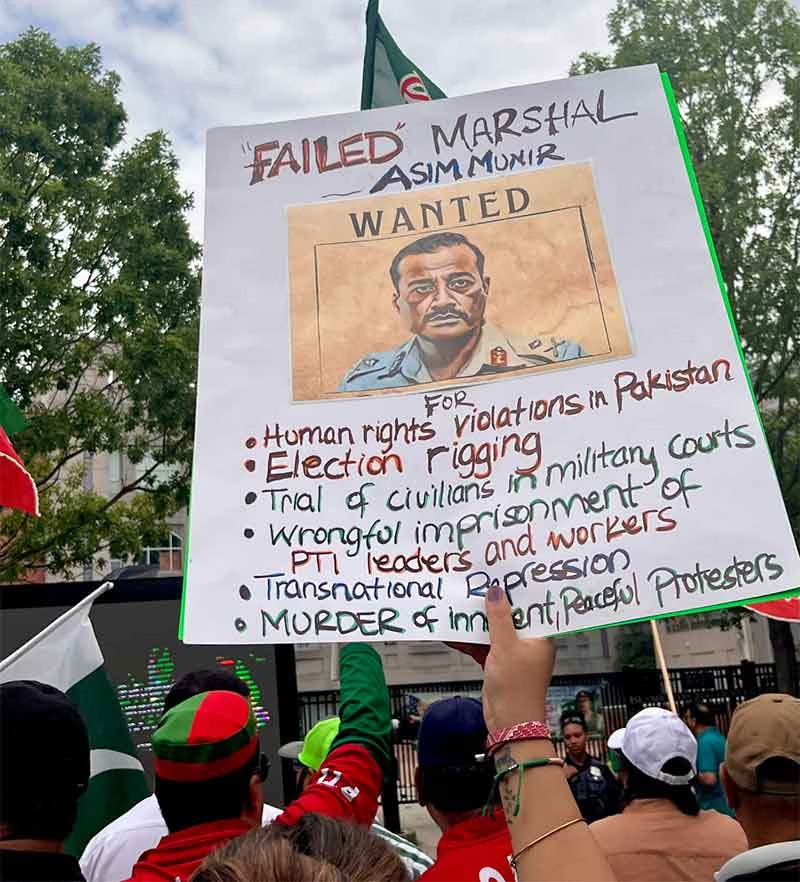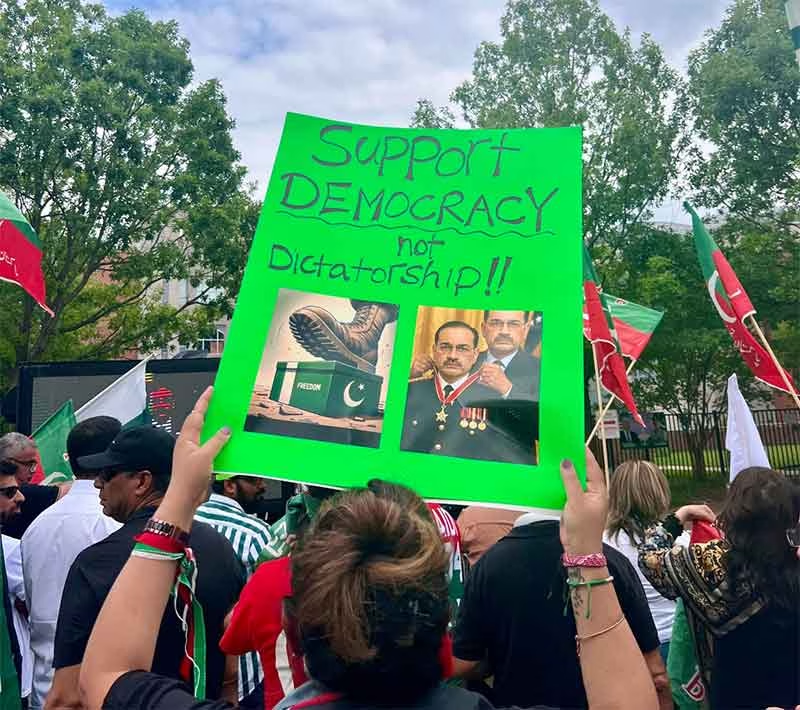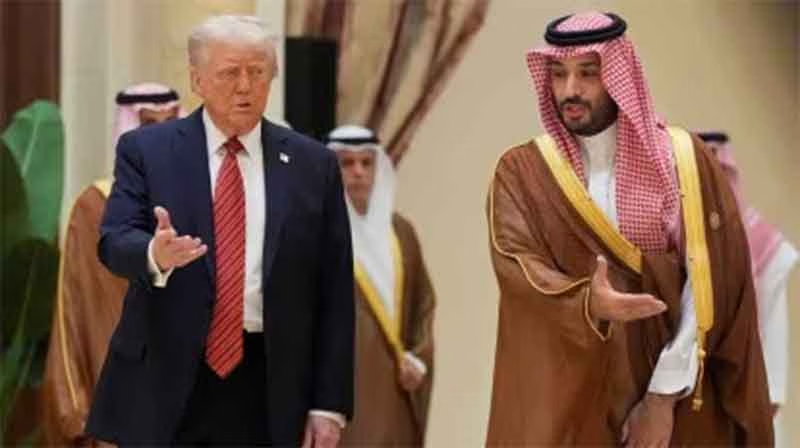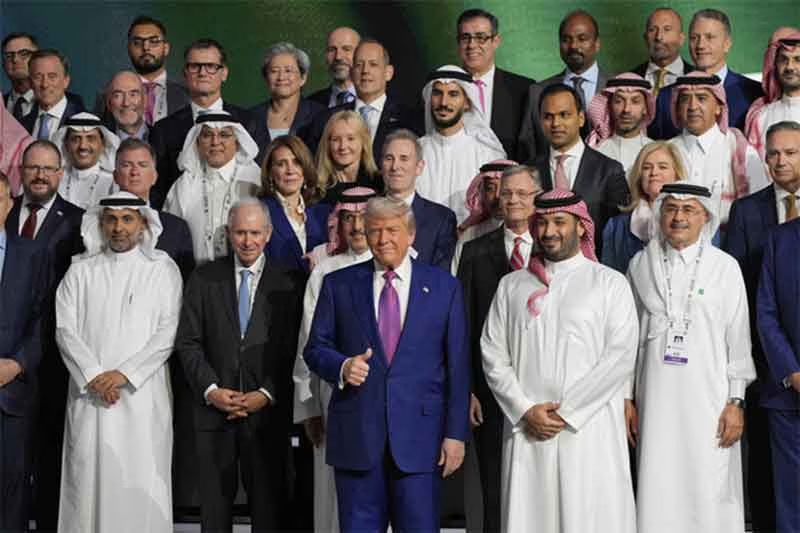
In the imperial theater of Washington, where regimes are puppeteered and loyalties auctioned, a curious ceremony unfolded. General Asim Munir, Pakistan’s top-ranking uniformed ruler, arrived not as a diplomat of a sovereign republic but as a dutiful envoy of dependency—polished boots, borrowed spine, and holy book in tow. It wasn’t a diplomatic visit; it was a political pilgrimage. An Umrah not to Mecca, but to the marble halls of American hegemony—complete with the Qur’an in one hand and a playbook of compliance in the other.
This wasn’t some off-the-record rendezvous. It was a coronation cloaked in pleasantries, a tribute to a man who has turned his country into a military estate while moonlighting as a cleric in camouflage. If Pakistan’s generals once held a monopoly on guns, Munir has added sermons to his arsenal. And Washington, ever the connoisseur of reliable strongmen, received him not with reluctance but with reverence.
General Michael Kurilla of U.S. CENTCOM sang Munir’s praises before Congress, calling Pakistan a “phenomenal partner in the counterterrorism world.” The phrase drips with irony. For decades, Pakistan’s military has treated terrorism not as a menace to defeat, but as an asset to manage. They rear militants like racehorses—some galloped toward Kabul, others herded into Kashmir, and the rest leased out to whichever patron was willing to pay. That the same generals now profit from counterterrorism contracts is less a twist of fate than the cunning design of empire.
But Munir’s journey to Washington wasn’t to reminisce over old alliances. He came to renew vows—between client and master, between gun and gold. And the message he delivered was crisp, calculated, and unmistakable: Pakistan remains a subcontractor for American power, ever willing to whisper verses of moral clarity in public while striking Faustian bargains in private.
Take Gaza. As Israeli bombs pummel a besieged population and Western leaders squirm under the weight of their own hypocrisy, Islamabad offers its routine package of condemnations—pre-written, perfunctory, and purposely ineffectual. Munir’s regime weeps on paper for the Palestinians while embracing covert cooperation with Tel Aviv. The Pakistani security establishment has learned to perform outrage like seasoned thespians—loud enough to appease the mosque-going public, but never disruptive enough to inconvenience the friends of Zion.



And then there’s Iran—where the theater of deceit reaches near-Shakespearean levels. The laughable idea that Pakistan’s ruling elites, military or civilian, support Iran in any meaningful sense would be comedy gold if it weren’t so tragic. Yes, someone in the Pakistani government reportedly told Tehran they stood with them. But so did Mohammad bin Salman, who phoned Iran’s Supreme Leader to express his concern over Israeli aggression. We are now grading regimes on who delivers the most solemn condemnation while doing absolutely nothing. Strong language is cheap, and the Muslim world has been having a clearance sale since the Gaza genocide began.
In truth, no one is more desperate to normalize with Israel than Pakistan’s political and military class. They’ve been salivating for Tel Aviv’s cutting-edge surveillance tech—the same tech lavished on New Delhi. It’s well known in diplomatic circles that the fastest route to Washington’s heart is through Tel Aviv’s intelligence desk. The generals of Rawalpindi took note long ago.
So in a country where 99% of the population is fervently anti-Zionist, the elite decided to test the waters of the Abraham Accords. Overnight, media outlets—never shy about following GHQ’s script—began arguing that perhaps shaking hands with Israel wasn’t such a terrible idea. Unfortunately for these normalization enthusiasts, the Pakistani people and Prime Minister Imran Khan slammed that door shut with a velocity that nearly dislocated wrists in Tel Aviv. Khan’s categorical rejection of this Zionist courtship was one of the many reasons he was later shown the exit by those who mistake coups for governance.
Meanwhile, a bizarre episode unfolded: Iran publicly claimed that Pakistan had assured them that if Israel nuked Iran, Pakistan would respond in kind. Cue the panicked denials. The ISI officer who made this brazen claim during a trip to Tehran has since vanished—into thin air, or more likely, into one of the ISI’s many memory holes. When it comes to commitments, the Pakistani establishment prefers the disappearing act.
Still, the charade continued. Trump himself invited General Munir for a personal tutorial in the dark arts of duplicity, though the general hardly needed instruction. He’s become a natural. The two men reportedly agreed on everything from Israel to Iran to whose back to stab next in the region. Like a good student of empire, Munir deployed his token civilian accessory—Shehbaz Sharif—to Tehran, mouthing brotherly platitudes while serving as a courier of subversion. The real message was clear: Pakistan, under its current custodians, would continue to play the snake in Iran’s garden—smiling as it bites.
Leaked briefings from the Trump-Munir rendezvous paint a picture of gleeful synchronicity. Munir reportedly pledged to keep Pakistan’s flirtation with China strictly transactional. As General Bajwa once joked to his American handlers that he didn’t even like Chinese food, Munir promised to go further: a drone base for “counterterrorism” operations, which in reality would serve as a launchpad for American muscle-flexing in China’s backyard. The base might as well come with a neon sign: “Now Serving Empire, 24/7.”
Some hopefuls in the Pakistani-American diaspora still fantasize that Trump might have told Munir to free his supposed ally, Imran Khan, from prison. Don’t hold your breath. If Trump did mention Khan, it was probably with the same sincerity he showed Iran during fake negotiations while greenlighting Israeli assassinations.
Let us not forget the Pakistani establishment’s military generosity—to Ukraine. Yes, while claiming strategic restraint elsewhere, Pakistan shipped weapons to Kyiv in bulk. All because General Bajwa wanted to prove to Washington that Imran Khan’s “aggressive neutrality” was a diplomatic sin. So the regime happily supplied munitions to Ukraine while making eyes at Moscow and peddling neutrality to the public. It’s geopolitical karaoke—just sing whatever the room wants to hear.
Which brings us back to the great Iranian illusion. Some in elite Pakistani circles still puff their chests and proclaim that Pakistan is prepared to assist Iran militarily. This is not just false—it’s delusional. These are the same elites who have been begging for Tel Aviv’s friendship for two decades, hosting backchannel envoys, and sending congratulatory signals disguised as policy ambiguity. Their commitment to Zionism is not a secret—it’s a résumé.
It is this very allegiance that Imran Khan rejected with open defiance. And it was this defiance that made him a liability for an establishment that values compliance over conscience. Regime change wasn’t just about power—it was about re-aligning Pakistan’s spine to the curvature of American and Israeli expectations.
Indeed, Munir’s true mission is to prove his fluency in the language of duplicity—a dialect spoken fluently in Riyadh and Tel Aviv, and mastered in Washington. He is auditioning for the role long played by the likes of General Sisi and MBS: authoritarian, Islamic-tinged, loyal to Empire, lethal to dissenters. A general who quotes the Qur’an but lives by the CIA handbook.
General Munir never lets a microphone pass without invoking his status as a hafiz—a man who has memorized the Qur’an. It’s a credential he wields like a talisman, as if the scripture will absolve the sins of his regime. But spiritual memory is no substitute for moral clarity. Somewhere between memorizing Surah Maryam and rehearsing military crackdowns, Munir appears to have skipped over the verses on justice, compassion, and the sanctity of human life. Perhaps in the same way Pharaohs recited ancient prayers while building pyramids on the backs of slaves.
Munir is not merely a hypocrite. He is the ideal specimen of American preference in Muslim leadership: religiously performative, domestically repressive, and geopolitically obedient. His regime has jailed dissidents, gagged journalists, and converted the judiciary into a costume party of kangaroo courts—all while smiling politely for Western cameras and preaching Islamic virtue to a battered populace.
Little wonder, then, that democracy in Pakistan is treated like a seasonal flu—something to be suppressed, mocked, or quarantined. Imran Khan, who dared speak of sovereignty and civilian rule, now rots behind bars while the real arbiters of power toast champagne in foreign capitals. Many in the Pakistani diaspora, especially those orbiting the Trumpian right, foolishly cling to the hope that the orange messiah will free Khan if reelected. But this is the genius of Empire: it creates the wound, offers the bandage, and charges you for both.
Yet behind this mask of pragmatic neutrality lies a deeper game. Pakistan’s military remains useful to Washington not in spite of its duplicity, but because of it. In an era where India is both partner and problem—lavished with defense deals but disobedient on Russia, Palestine, and BRICS—Pakistan becomes a tool for subtle coercion. A well-timed skirmish in Kashmir, a terrorist scare in Punjab, or a diplomatic spat with Dhaka—all of these become levers to keep Modi in check. Munir plays this role with the smugness of a man who knows that even puppets can pull strings.
And then there’s the China card. Beneath the rhetoric of counterterrorism cooperation lies a thinly veiled espionage operation. The resurgence of American intelligence activity in Pakistan—particularly in Baluchistan and Gilgit-Baltistan—mirrors the playbook of containment. The recent spate of attacks on Chinese workers and projects? Far from random acts of violence. These are pressure points, signaled by forces who know exactly where to poke. That some elements within Pakistan’s own security apparatus appear complicit only confirms how much of the state has become an auction house of allegiances.
None of this is surprising. What is grotesque is the sanctimony with which Munir cloaks his betrayals. It is not enough to oppress a people; he must do it in the name of faith. It is not enough to sell out a nation; he must do it while quoting Hadith. The performance is exhausting, but effective—at least to those too starved to notice they’re being fed poison with golden spoons.
And so, while Pakistan’s youth struggle with unemployment, inflation, and a collapsing educational system, while the courts are weaponized and elections rendered fiction, while activists disappear into black sites and families mourn in silence—Munir parades through Washington as a statesman of stability. A man with no mandate, no legitimacy, no moral compass—lionized as a “reformer” by think tanks run by arms dealers and ideologues.
The people of Pakistan deserve better. Not just from their rulers but from a world that claps for tyrants if they recite the right slogans. Munir’s reign is a symptom of a broader disease—the normalization of authoritarianism when it serves geopolitical interests. Strip away the uniforms, the Qur’ans, and the press releases, and what remains is a security state moonlighting as a theocracy, propped up by foreign funds and shielded by international apathy.
Let the photo-ops continue. Let CENTCOM issue more praise. Let the New York Times run puff pieces about “moderate military men.” But history, unlike newspapers, doesn’t forget. It remembers who stood with the oppressed and who supped with their executioners.
Munir’s visit to Washington will not be remembered as a diplomatic milestone. It will be recorded—indelibly—as a page from the playbook of betrayal: betrayal of Iran, of Gaza, of China, and above all, of the very people in whose name he rules.
And when the Qur’an is next recited in Rawalpindi’s echoing halls, it may fall upon those verses that speak not of power, but of justice. Not of obedience to Empire, but of accountability before God. Munir may have memorized the text. But history will judge whether he ever understood it.
Subscribe to Our Newsletter
Get the latest CounterCurrents updates delivered straight to your inbox.
Prof. Junaid S. Ahmad teaches Law, Religion, and Global Politics and is the Director of the Center for the Study of Islam and Decolonization (CSID), Islamabad, Pakistan. He is a member of the International Movement for a Just World (JUST – https://just-international.org/), Movement for Liberation from Nakba (MLN – https://nakbaliberation.com/), and Saving Humanity and Planet Earth (SHAPE – https://www.theshapeproject.com/).















































